A New War on Cancer – Part 2
Air Date: Week of July 7, 2023
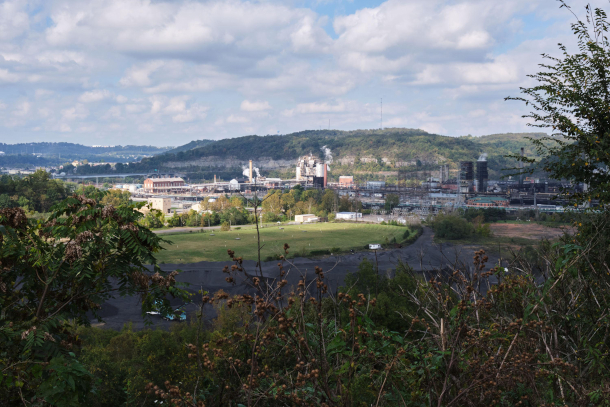
Clairton Coke Works is owned by US Steel and is the largest coke plant in the US, producing about 4.7 million tons of coke per year. In early 2023 US Steel was fined $307,000 by Allegheny County for air pollution violations. (Photo: Njaimeh Njie)
Kristina Marusic and Host Steve Curwood continue their conversation about preventing cancer by reducing exposure to carcinogenic chemicals. Kristina Marusic shares the inspiring stories of cancer prevention advocates and discusses how lifestyle choices are overemphasized as cancer culprits, while chemical and pollution risk factors that people have no individual control over are too often overlooked.
Transcript
DOERING: It’s Living on Earth, I’m Jenni Doering.
CURWOOD: And I’m Steve Curwood.
We’re back now with our conversation with Kristina Marusic about her book, A New War on Cancer: The Unlikely Heroes Revolutionizing Prevention. Before the break, we heard the backstory of one of those heroes, Ami Zota, who teaches public health at Columbia University.
CURWOOD: So, Ami is noted for her work in cosmetics and other risks from endocrine disrupting chemicals. In fact, she's been on the Living on Earth broadcast. What do you think her experience as a woman of South Asian descent and a woman, what do you think her experiences along those lines helped her when she came to the field of public health and questions about these chemicals, which can be pretty dangerous to us, not just endocrine disruption, but of course cancer itself as well?
MARUSIC: Ami was one of the first researchers to frame those disproportionate exposures of toxic chemicals in beauty and personal care products among women of color as an environmental justice concern, and she helped develop a framework called the environmental injustice of beauty, but this framework links racism, sexism, and classism to negative environmental health outcomes. And one of the studies I wrote about in my book was a study she conducted in 2015, or she was a co-author for, and it was one of the first scientific studies to look at the connection between race and exposure to phthalates in feminine care products. Phthalates are endocrine-disrupting chemicals that interrupt our body's natural hormonal processes, and exposure to phthalates is linked to lots of negative health impacts, including things like obesity, reproductive harm, lowered IQ, and cancer. And Ami's study from 2015 found that using products like vaginal douches can contribute to phthalate exposure, and that higher rates of douching among Black women contributes to higher levels of exposure to certain phthalates than those seen in white women. But Ami's work is really revolutionary because she didn't just discover that link. She also insisted in her paper that we need to contextualize why practices like vaginal douching are more prevalent among Black women. And the context for that is that historically, white colonizers and enslavers used real or invented racial differences, like skin color, hair texture, and vaginal odor, as justifications for treating Black women as less than human. And so, striving to erase those real or invented differences became a survival adaptation. And the continued prevalence of vaginal douching among Black women is a lingering effect of that survival adaptation. So, Ami wrote, like, we can't address this problem of Black women being more exposed to these harmful chemicals without acknowledging the ways that systemic racism contributes to those realities. Another example is that women of color are more likely to use relaxers and straighteners to achieve straight hair, and hair relaxers and straighteners marketed to women of color contain more toxic and cancer-causing chemicals than hair products marketed to white women. And this also contributes to disproportionate exposure to cancer-causing chemicals among women of color.
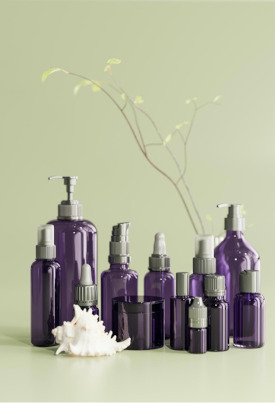
Many personal care products and cosmetics contain phthalates which have been linked to breast and bone cancers, among other health problems. (Photo: pmv chamara on Unsplash)
CURWOOD: Your book is wonderfully written, and I encourage anyone who's more curious about this to look at it but we don't have enough time here to go through all of the people you call as unlikely heroes. But briefly, aside from Ami Zota, who else really impressed you in the process of writing this book?
MARUSIC: I also profiled an activist named Melanie Meade, who is a clean air advocate in Clairton, Pennsylvania, which is near where I live in Pittsburgh, it's in the same county about a 20-minute drive away. And Clairton regularly has some of the dirtiest, most polluted air in the country. Clairton is home to U.S. Steel's Clairton Coke Works, which is the biggest coke-making plant in the country. Coke is an ingredient used to make steel, and it's made by heating coal to extremely high temperatures, and the emissions are very, very carcinogenic. And it's also one of the oldest plants still doing that in the country, and the pollution controls have not been updated appropriately in a long time. And so, advocates there tend to refer to this as a pay-to-pollute system where it's cheaper for U.S. Steel to just pay the fines that they get for violating clean air laws on a regular basis, rather than overhauling their operations and putting in better pollution controls. And Melanie grew up there, has lived there most of her life, and over the span of about eight years, she lost every member of her immediate family to either cancer, respiratory disease, or heart disease. So that included both of her parents and her three siblings. And most people, I think, would have left at that point, but she has stuck around and is determined to fight for cleaner air on behalf of her community. I find her story and her resilience really moving. And it was really a privilege to get to know her and share her story in the book
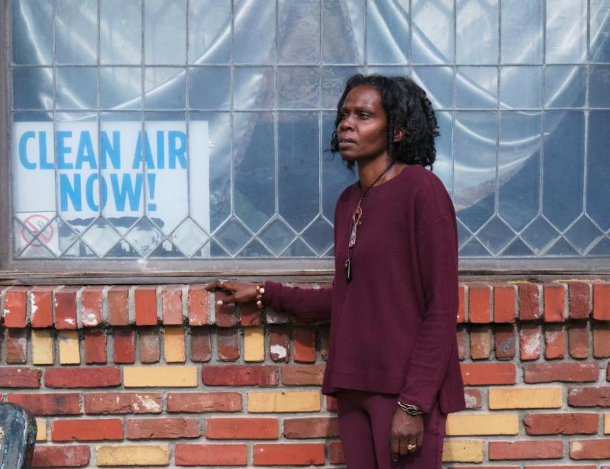
Melanie Meade is a grassroots clean air advocate from Clairton, Pennsylvania, the location of the largest coke making plant in the United States. (Photo: Njaimeh Njie)
CURWOOD: And remind us of what you wrote when people said, "Well, why don't you just move"?
MARUSIC: Melanie told me, you know, that's where her community is. She's lost her immediate family, but that's really where her roots are. That's where both of her parents grew up, her family actually owned land and farmed that land in Clairton for generations, long before U.S. Steel ever came to Pittsburgh. So, she really feels like this is my community and it's worth staying and fighting for them. And I think part of the reason that's so inspiring is because I know there are Melanie Meades all over the country, who are in communities facing pollution and up against huge corporations and facing really impossible odds. And they stay and they fight instead of just moving somewhere else.
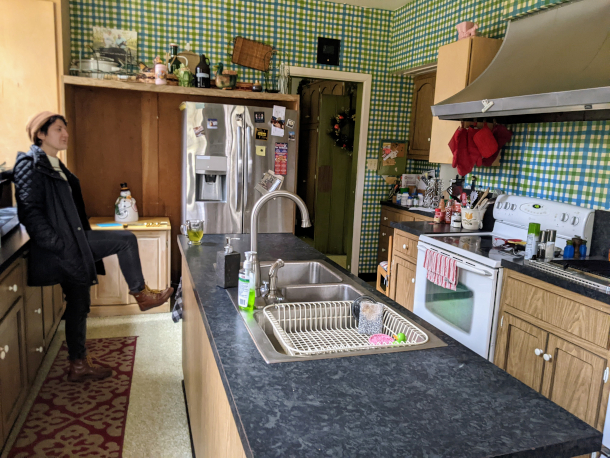
Berry Breene in her family's Oil City, Pennsylvania home. Berry was diagnosed with breast cancer at the beginning of the Covid 19 pandemic. (Photo: Kristina Marusic)
CURWOOD: Let's talk about PFAS for a moment. The so-called “forever chemicals” that are used in a wide range of products, including plastics and clothing and cosmetics and, and such. Now, in March, the EPA announced its first-ever national drinking water standards for six of these forever chemicals. Actually, there're probably thousands of them, but it's taken years for the federal government to even take action on these issues. What are some of the researchers that have pushed for regulations around PFAS, and what kind of impact have they had?
MARUSIC: I spoke with one researcher whose work focuses on PFAS for the book, her name is Laurel Schaider, and she's a researcher at Silent Spring Institute, which is a breast cancer prevention research nonprofit. And her work was among the first to find that PFAS are being applied to most of our to-go food wrappers, like the paper underneath of your pizza in the pizza box. And the little brown sheets of paper that your baked goods go in at the coffee shop. And even those brown biodegradable containers on your favorite salad bar often are coated with PFAS on the inside. And then she did a follow-up study that found that those chemicals are also migrating from that packaging into our bodies. And that people who tend to eat a lot of takeout had higher levels of PFAS chemicals in their bodies than people who mostly cooked their food at home. So those new drinking water limits that you mentioned are really important, you did mention that there are thousands, every time I check, the number of PFAS seems to have gone up. I think in my book, I said upward of 9,000 and now they're saying upwards of 15,000 different chemicals that fall under this category. So, putting a limit on six in drinking water, a lot of activists and advocates and health advocates say that doesn't go far enough, but it's still a big deal to kind of get the ones that tend to get into our water most frequently. But certainly, you know, we're exposed to PFAS in many, many other places in addition to drinking water, and food is a really big source of that. So, I would say, you know, based on my conversations with Laurel Schaider, that we also really need to think about regulating PFAS in food and food packaging, if we want to meaningfully reduce our exposures to those chemicals.
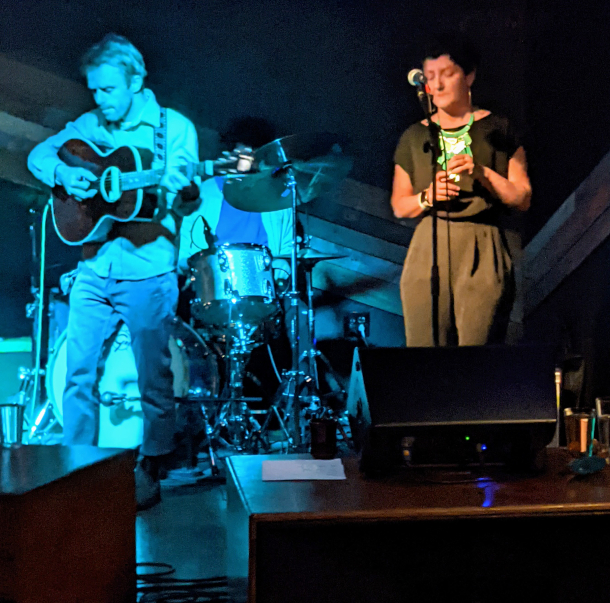
Berry Breene singing with the band Her Ladyship. Berry is an artist and a musician and her public murals can be found across Western PA. (Photo: Kristina Marusic)
CURWOOD: Throughout your book, The New War on Cancer: The Unlikely Heroes Revolutionizing Prevention, you tell us the story of Berry and her struggle with cancer. She's a young artist, I guess she grew up not too far from where you are in Pennsylvania. What sort of cancer did she experience, and why did you tell Berry's story?
MARUSIC: Berry was diagnosed with breast cancer at the beginning of the COVID-19 pandemic. She got her diagnosis in March 2020. So, she had a particularly difficult experience going through her cancer diagnosis and treatment because she was mostly alone, because the world was in quarantine. And I wanted to include Berry's story in the book because it felt important to include a portrayal of what we're trying to prevent. So, we've gotten very good at treating cancer, thanks to all of that funding that goes toward cancer treatment and prevention that we discussed. So, a lot more people survive cancer today than did in the past. But treatment is extremely difficult. It's painful and it's scary and it's traumatic, and cancer survivors can have lifelong health complications related to the disease or the treatment they get for it. And any cancer survivor, including Berry, would tell you that they would have much rather had prevention than a cure. And I wanted that message to be central throughout the book, which is why Berry's story is woven throughout the chapters about the other people I write about in the book. Berry also had an experience that's common to a lot of people who get a cancer diagnosis, which was wondering if the choices she had made throughout her life contributed to her disease. You mentioned that she's an artist, and she mostly paints large murals and so, she was thinking, is this because I haven't worn protective gear when I've been painting? Is this because of those cigarettes I smoked when I was in college? Is this because I haven't been working out, or eating my leafy greens? And one of the reasons I thought her story was so important to include is that when we talk about prevention, we almost exclusively talk about personal lifestyle choices like diet and exercise and not smoking. And as a result, a lot of people who get a cancer diagnosis immediately start blaming themselves, or they feel shame and concern about, you know, what choices they made that might have led to their diagnosis. Especially if, like Berry, Berry didn't have any breast cancer in her family and she wasn't genetically predisposed to the disease, but Berry did grew up in a town that was once filled with oil refineries, and she spent most of her adulthood living in a city with lots of air pollution. And there are factors that raise our cancer risk that are outside of our individual control, that require us to work together and address them at a systemic level. Things like air pollution, things like our exposure to cancer-causing chemicals in our cosmetics and our beauty products and our food and our water. Those are things we need to work together to find solutions for. And when we leave out those kinds of risk factors in our discussions about cancer prevention, and make it all about, you know, the individual person's consumer and dietary habits, we're just not seeing the full picture and we're missing a whole world of opportunities for cancer prevention.
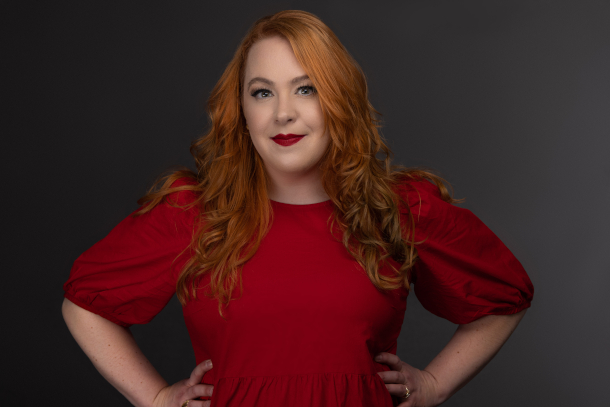
Kristina Marusic covers environmental health and justice issues in Pittsburgh and Western Pennsylvania for Environmental Health News and she is the author of "A New War On Cancer: The Unlikely Heroes Revolutionizing Prevention". (Photo courtesy of Kristina Marusic)
CURWOOD: Part of your subtitle includes the words “revolutionizing prevention.” In this season of the independence of the United States and that Revolutionary War, what revolution are you calling for?
MARUSIC: I'm calling for a revolution in the way we think about and talk about cancer risk and cancer prevention. And I'm specifically calling for a revolution in the way we fund cancer research and cancer prevention, right? So, I'm saying we need an influx of funding to help advance meaningful cancer prevention, and we need to really engage systems-level thinking and collaborative systems-level work to find solutions that will lower cancer risk for all of us, instead of putting all the burden on the individual to, you know, be a perfect consumer and eat organic and filter their air. All those things are worth doing, I would never want to discourage anyone from taking steps that might protect their individual health. And I would never say that we should stop funding or advocating for cures or treatments for cancer. My sister had thyroid cancer and cures and treatments saved her life, so I'm incredibly grateful that those existed. I am saying that while we continue looking for a cure, and funding new treatments, we need to do a lot more to prevent cancer. And it's not just that we need to, but it's that we can, right? It's that there's this whole array of ways to prevent cancer that we are not currently tapping or taking advantage of, and we could be preventing a lot of cancer if we shifted the way we think about this and talk about this.
CURWOOD: Kristina Marusic's book is called A New War on Cancer: The Unlikely Heroes Revolutionizing Prevention. Thanks so much for taking the time with us today, Kristina.
MARUSIC: Thanks so much for having me, Steve. It's been great talking to you.
Links
Learn more about Kristina Marusic
National Library of Medicine “Environmental exposures and cancer: using the precautionary principle”
National Cancer Institute “Cancer-Causing Substances in the Environment”
Living on Earth February 17, 2023: High Levels of PFAS in Wild Freshwater Fish
Watch Kristina Marusic’s conversation with grassroots activist Melanie Meade
Watch Kristina Marusic’s conversation with Ami Zota and Zaria Golombek
Living on Earth wants to hear from you!
Living on Earth
62 Calef Highway, Suite 212
Lee, NH 03861
Telephone: 617-287-4121
E-mail: comments@loe.org
Newsletter [Click here]
Donate to Living on Earth!
Living on Earth is an independent media program and relies entirely on contributions from listeners and institutions supporting public service. Please donate now to preserve an independent environmental voice.
NewsletterLiving on Earth offers a weekly delivery of the show's rundown to your mailbox. Sign up for our newsletter today!
 Sailors For The Sea: Be the change you want to sea.
Sailors For The Sea: Be the change you want to sea.
 The Grantham Foundation for the Protection of the Environment: Committed to protecting and improving the health of the global environment.
The Grantham Foundation for the Protection of the Environment: Committed to protecting and improving the health of the global environment.
 Contribute to Living on Earth and receive, as our gift to you, an archival print of one of Mark Seth Lender's extraordinary wildlife photographs. Follow the link to see Mark's current collection of photographs.
Contribute to Living on Earth and receive, as our gift to you, an archival print of one of Mark Seth Lender's extraordinary wildlife photographs. Follow the link to see Mark's current collection of photographs.
 Buy a signed copy of Mark Seth Lender's book Smeagull the Seagull & support Living on Earth
Buy a signed copy of Mark Seth Lender's book Smeagull the Seagull & support Living on Earth

